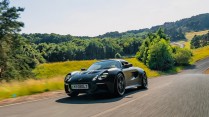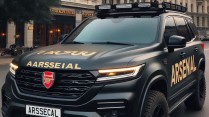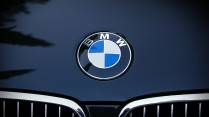Alpine Sports Car Unleashes Power with Hydrogen Combustion Turbo Engine
By Dabbie Davis
May 11, 2024 01:18 AM EDT

French automaker Alpine has showcased a racing prototype fueled by hydrogen, not gasoline. Named the Alpenglow Hy4, this supercar uses hydrogen combustion technology to advance future vehicle development. Evolving from the 2022 Alpenglow concept, the Hy4 functions as a live prototype boasting a 340-horsepower turbocharged 2.0-liter engine.
Operating at 7,000 rpm, the engine draws from three hydrogen tanks, each holding 4.6 pounds of hydrogen pressurized at 700 bar. Power is transferred to the wheels through a sequential transmission.
Alpine Presents Alpenglow Hy4
Alpine today presents the Hy4, a hydrogen-powered car, after introducing the Alpenglow concept at the 2022 Paris Motor Show. Autocar reports that the Alpenglow idea was introduced two years ago. It is scheduled for debut at the upcoming Spa-Francorchamps, Belgium.
Performance is claimed to be on par with its gasoline equivalent.
Alpine has adjusted the Alpenglow's dimensions compared to the 2022 concept to accommodate this system, elevating its height slightly and reworking the crash structure to accommodate two occupants. The hydrogen tanks are now housed in the sidepods.
The vehicle is set to conduct showcase runs at various prominent occasions, contributing to the advancement of a brand-new hydrogen-powered V6 currently in progress at Alpine. This engine is intended to replace the current four-cylinder in the Alpenglow by the year's end and is expected to drive the company's entry in the 2027 Le Mans 24 Hours-the inaugural year permitting hydrogen-combustion vehicles to participate. Alpine emphasized its vigilance towards regulatory shifts within motorsport.
Meanwhile, Forbes reported that while the Hy4 will initially debut on a racetrack, Alpine characterizes the carbon-monocoque vehicle as a model that serves as a "nod to a forthcoming hypercar, bridging the gap between racing and road usage." With a two-seat cockpit and a design hinting at potential appearances on both circuits and streets in the future.
In a statement, Bruno Famin, the vice president of Alpine Motorsports, expressed that within Alpine's commitment to reducing carbon emissions in motorsports, the hydrogen internal combustion engine is viewed as a highly promising solution.
Famin acknowledged hydrogen's crucial role in decarbonizing future generations of endurance race cars and even potentially in Formula 1 vehicles, especially through transitioning to liquid storage for enhanced compactness and performance.
READ MORE: Reimagined Rolls-Royce Cullinan Series II Targets Young Affluent Buyers
Autocar shared its perspective on hydrogen utilization in automobiles. The purported advantage of hydrogen internal combustion engines is their ability to preserve the sensation and sound of a conventional gasoline engine while emitting solely water and NOx. However, the feasibility of this technology hinges on the energy origins.
'Grey' and 'blue' hydrogen are derived from natural gas, resulting in the emission of harmful carbon compounds during production, whereas 'green' hydrogen is produced by electrolyzing water with electricity from renewable sources, thus avoiding such emissions.
Learn More About Alpine Hy4
As reported by Motor1.com, the Hy4 differs from the original Alpenglow concept as Alpine made adjustments to the vehicle's body. These alterations include a revised crash structure to accommodate a two-seater cockpit and the integration of hydrogen tanks into the side pods. The Hy4 now features increased height and a redesigned aerodynamic package, highlighted by a new roof scoop.
Despite being designed for track use exclusively, Alpine believes that the powertrain technology utilized in the Hy4 could also be suitable for a road-legal model. The French automaker even suggests that a hydrogen-powered internal combustion engine presents a highly promising solution for on-road applications.
RELATED ARTICLE: Lexus Explores Electric Avenue with ES350e and ES500e Models
Copyright @ MOTORTIMES, All rights reserved. Do not reproduce without permission.








